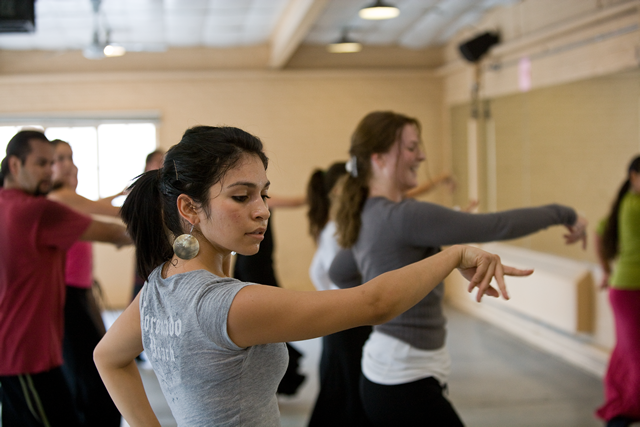
Theatre & Dance ETDs
Publication Date
6-28-2010
Abstract
Within the past ten years, flamenco, the musical genera from Andalusia, Spain has gone through a very evident transformation. This transformation involves an intellectualization of flamenco, in that there is an increasing preoccupation with technique. This concern for technical virtuosity can be seen in the complexity of flamenco music, as well as the increased skill of dancers, most apparent in their physical ability and musicality. This technical revolution has even influenced the manner in which shows are produced, and is highlighted by a sense of innovation, realism, and the increased use of literary and philosophical themes. In the current state of flamenco dance, movements are becoming more symbolic as opposed to gestural, dancers are exploring a variety of concepts, themes, and aesthetics, and there appears to be an ideological shift toward innovation. These changes in the dance have developed from the globalization of flamenco, or what Marta Savigliano calls worlding' in her article, 'World Dance and Dancing Out There in the World. As a result of the 'worlding' of flamenco, it has shifted from cultural practice to low art (popular art); and from low art to high art (fine art). With this shift, flamenco dance has even been integrated into university dance programs in the United States, sitting alongside concertized dance forms like ballet and modern dance. This essay examines the current state of flamenco dance as a result of modernism, globalization, and the world dance phenomenon (in the United States). Some of the most current flamenco dancers are creating works that appear to incorporate characteristics that resemble contemporary choreographic elements. These elements manifest themselves as inclusions of more diverse uses of space and perspective, variations on traditional themes, as well as hyperstylizations and variations in aesthetic. This essay specifically entails the analysis of a select body of work by dancers in what I have come to call, La Nueva Escuela de La Danza Flamenca, or The New School of Flamenco Dance. I focus, specifically, on the technical ways in which this emerging group of dancers are innovating flamenco, and the challenges these innovations bring to the basic mechanism of flamenco dance. Furthermore, I discuss my own experiences as a flamenco-focused, MFA student as a means to highlight the tension that occurs when flamenco is integrated into a contemporary dance paradigm. From this research what becomes apparent is that these dancers are shifting the priority of flamenco dance, and setting new standards in a mode that is distinctly of the 21st century and characteristically postmodern, depicting a departure from romanticism, and a movement toward realism, innovation and technical virtuosity.
Degree Name
Dance
Level of Degree
Doctoral
Department Name
Theatre & Dance
First Committee Member (Chair)
Encinias Sandoval, Eva
Second Committee Member
Herrera, Brian
Third Committee Member
Brulotte, Ronda
Fourth Committee Member
Jewell, Donna
Language
English
Keywords
Flamenco--History and criticism, Flamenco--History--21st century
Document Type
Dissertation
Recommended Citation
Gomez, Illeana. "La Nueva Escuela De La Danza Flamenca: Postmodern Shifts in Flamenco Dance." (2010). https://digitalrepository.unm.edu/thea_etds/15
